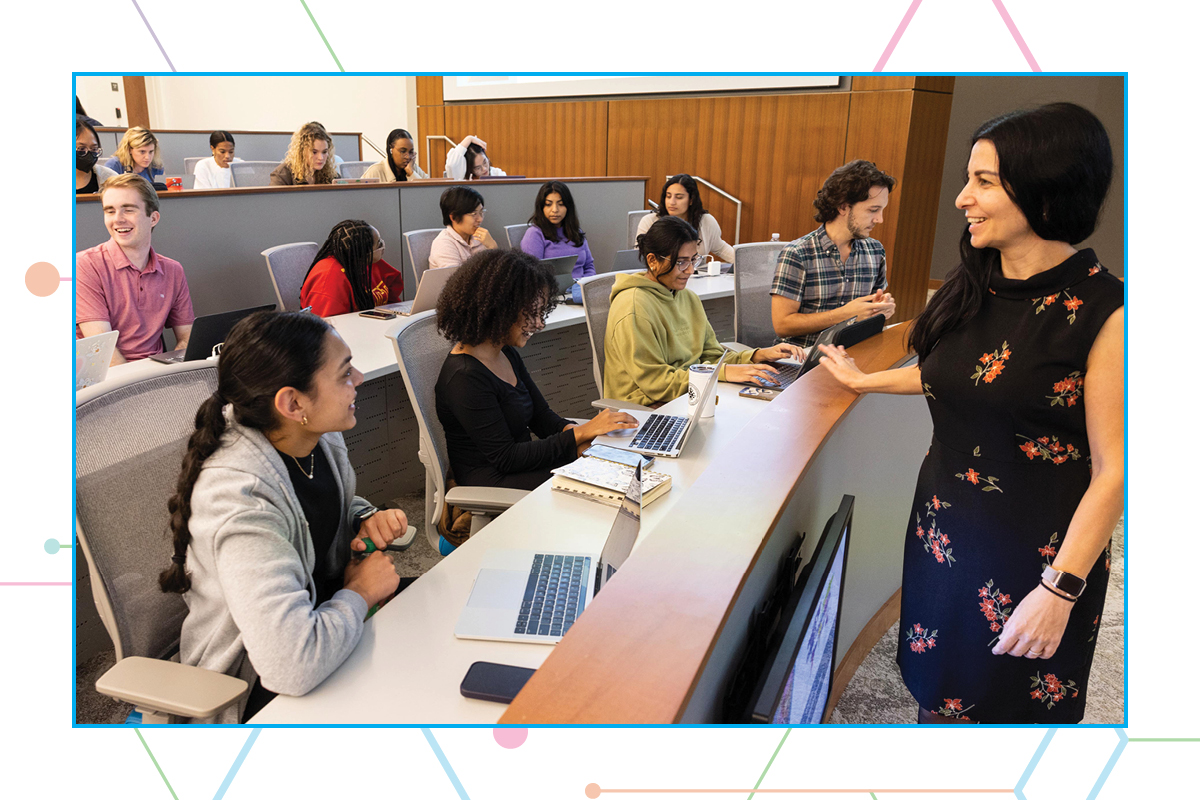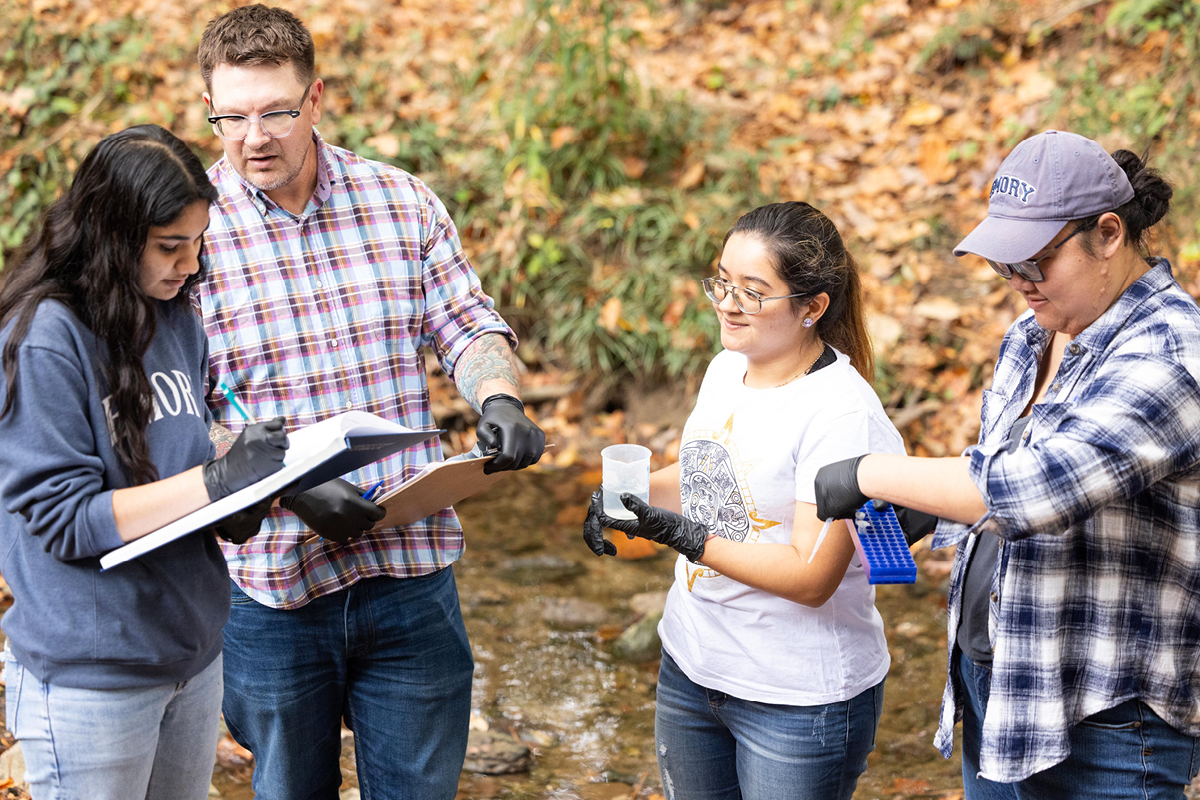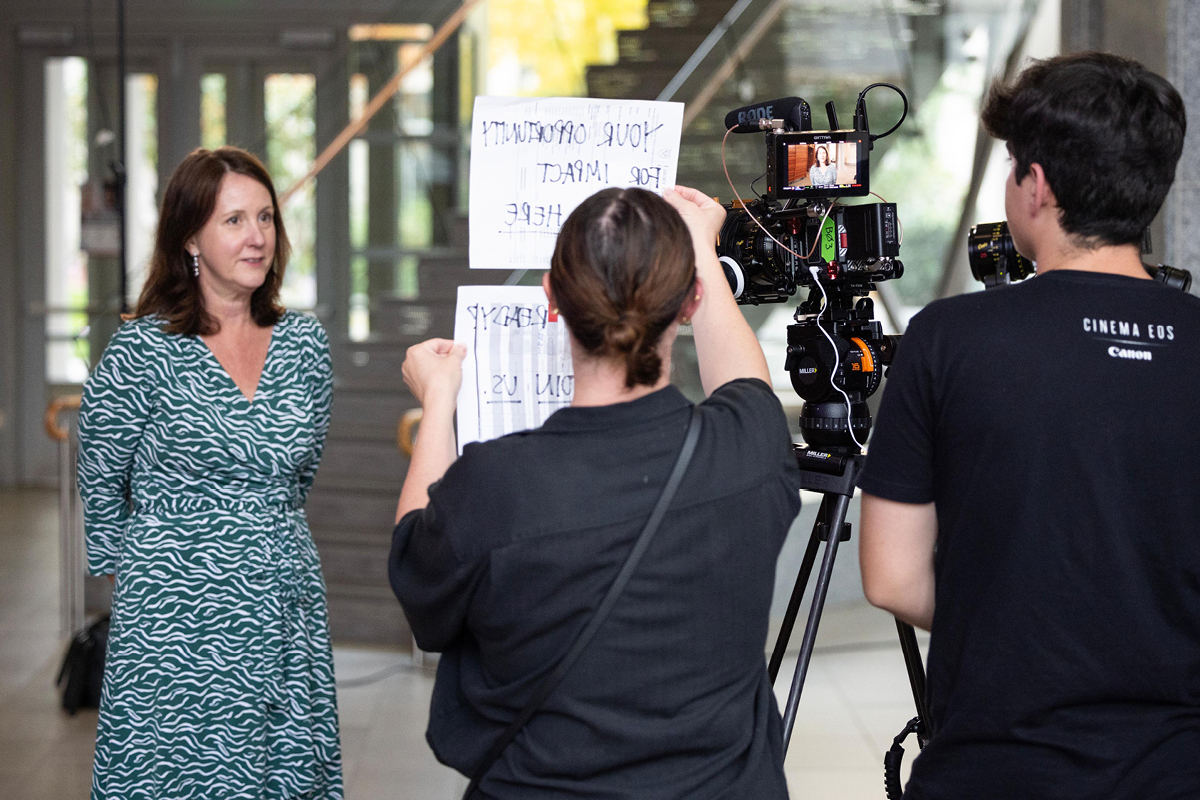Strategic Plan Spotlight
Updates and accomplishments achieved within the plan’s first year

Last September, Rollins launched a five-year strategic plan. It outlined six goals to help the school achieve its mission of delivering on the promise of public health for all through leadership in public health education, research, and practice.
"The strategic planning process was inclusive, and we heard from all parts of our community,” says Dean M. Daniele Fallin, PhD. “Now it is a privilege to dig into the hard work of pursuing our collective strategic goals."
One year into that work reveals some key achievements in each of the six core goal areas.

Education
 Goal:
Goal:
We will broaden who we teach, diversify how we teach, and enrich what we teach in response to evolving public health priorities and emerging challenges.
Progress:
• Offering approximately seven Rollins Health Education Institute courses in summer 2024, including remote learning options to reach a wider set of learners.
• Enhanced capacity in instructional design and pedagogical expertise to support faculty and instructors in the development of their online courses.
• Initiated the development of a doctoral-level grant-writing course for students across programs in response to feedback from the Doctoral Student Advisory Board.
• Developed online part-time degree programs in behavioral, social, and health education sciences; global environmental health; global health; and health policy.
• Received approval for a new, fully online DrPH program, which included curriculum development, programming plans, and business plans. The first DrPH cohort is anticipated to enroll for fall semester 2025.
• Appointed Moose Alperin, EdD, as director of online education, and Allison Chamberlain, PhD, as director of the DrPH program.

Research
 Goal:
Goal:
We will advance public health science that improves health and health equity through rigorous, collaborative, and interdisciplinary research.
Progress:
• Developed a faculty research incentive policy to reward faculty who exceed expectations and make exceptional contributions to the school.
• Supported the development of large program applications, including a collaborative grant to work with service sectors on the development of structural interventions.
• Reimagined research support by developing and implementing the Rollins Office of Administration and Research.
Practice and Partnerships
 Goal:
Goal:
We will build ethical and equitable collaborations with local, regional, and global partners to engage communities and translate our research into mutually beneficial public health practices, policies, and programs.
Progress:
• Completed the first year of a fully reimagined Woodruff Health Sciences Center Interprofessional Education – Achieving Collaborative Team Solutions program.
• Collaborated with Emory Healthcare on multiple initiatives that bring public health expertise and evidence to health care practice.
• Appointed Allison Chamberlain, PhD, as the director of research and practice relations with the Georgia Department of Public Health (DPH). Her role is to facilitate research and practice partnerships with the various state and local DPH entities.
Our People
 Goal:
Goal:
We will cultivate a school where all members of our community have opportunities for professional growth and feel included, respected, and valued.
Progress:
• Implemented individualized faculty onboarding process, including personalized meetings, comprehensive overview of Emory systems, and assignment of a navigator to address diverse needs.
• Established a task force to address staff food insecurity, led by faculty and staff members, with students involved in developing surveys and evaluations.
• Identified key data needs across central units to facilitate accurate and timely reporting to leadership and faculty.
Diversity, Equity, and Inclusion (DEI)
 Goal:
Goal:
We will center diversity, equity, and inclusion in our identity through our research, practice, operations, and educational activities.
Progress:
• Initiated the Student Bias Reporting Navigation Tool to assist faculty, staff, and students in clearly understanding their options for reporting possible bias and discrimination incidences.
• Continued support for our Community and Diversity Committee, consisting of more than 70 faculty, staff, and students engaged in DEI activities across the school.
• Implemented the DEI curriculum assessment tool to foster ongoing reflection and improvement of course content and implementation through the DEI lens.
Communications
 Goal:
Goal:
Promote and strengthen trust in public health information.
Progress:
• Supported more than 200 one-on-one conversations between Rollins faculty and media from September 2023-July 2024.
• Created a new Rollins Instagram channel (@EmoryRollinsSph), which gained 20,000 followers within 24 hours of launch and has a high level of engagement, with many posts receiving more than 2,000 likes.
• Evolved Rollins magazine—expanding its reach, adjusting its design, and reshaping its focus.
• Launched a weekly radio show and podcast, HEALTH WANTED with Laurel Bristow, on local NPR affiliate WABE.


Strategic Plan in Action: Mental Health Research Hub
One objective of the strategic plan’s research goal is to “encourage scientific innovation and growth of research that enhances our current strengths and addresses critical and emerging areas of need.” A key way Rollins is working to achieve that vision is through establishing research hubs that bring together faculty around important public health topics, including mental health.
Rollins has long been home to experts in mental health research, some who come from clinical backgrounds and some who do not. Although many have collaborated through research projects or guest lectures in the past, there has been a growing desire to establish a more formal way to build a collaborative community that includes not only faculty, but also staff and students who are interested in public mental health. With that vision, initial plans were set in motion to form a mental health research hub in late 2023.

An initial focus for the research hub will be creating more opportunities for Rollins students, especially those who are in the mental health certificate program and need to complete an applied practice experience related to mental health. Waford also notes there are opportunities to partner with current courses and initiatives at the school to involve MPH students.
“What I want out of this group is to find out how we can collaborate more together, formally or informally, to improve service delivery for community members who have lived experiences with mental health conditions, and strengthen systems for all mental health stakeholders,” Waford says.
To learn more about Rollins’ five-year strategic plan and progress made toward achieving its goals and objectives, visit: strategicplan.sph.emory.edu.





